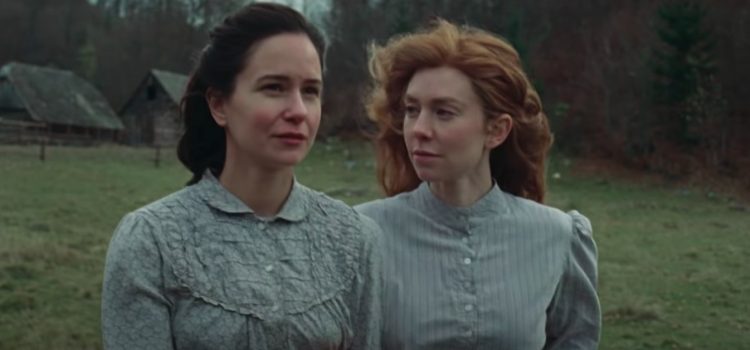By Alex McPherson
The film unfolds during the late 1850s, somewhere along the East Coast of the US. In the midst of a harsh winter, Abigail (Katherine Waterston) lives on a farm with her emotionally distant husband, Dyer (Casey Affleck). They’re gradually drifting apart, trapped by circumstance and grieving the death of their young daughter. They depend on each other but avoid addressing the underlying problems in their relationship. Abigail, an intelligent, highly literate individual, finds some solace through writing in her diary, where she can freely express herself.
Abigail eventually falls for Tallie (Vanessa Kirby), an alluring woman moving in nearby. Tallie lives with her husband, Finney (Christopher Abbott), a cold-hearted farmer who insists that she remain his subordinate. As Abigail and Tallie’s friendship grows into something more, the two must persevere through extreme adversity within a world seemingly operating against them.
Although “The World to Come” provides few surprises, it does an admirable job at establishing Abigail and Tallie as three-dimensional individuals imprisoned by the norms that are forced upon them. The film’s patient, deliberate pacing also belies a searing anger at the ways they are treated by society at large.
“The World to Come” initially feels like a horror film, as viewers observe a bleak, snow-covered landscape matched by a fractured household. Narration from Abigail’s diary, which continues somewhat repetitively throughout the film, establishes her mourning for her previous life with her husband and child. This is combined with a clarinet-based score that ebbs and flows in keeping with her turbulent emotions and unpredictable environment.
Tallie, also enduring a troubled relationship, is more courageous in the face of others’ standards. Abigail and Tallie’s bond — convincingly portrayed by Waterston and Kirby with meaningful glances and sharp enough dialogue — offers them both an opportunity to chart a new path forward. Tallie provides Abigail a chance to symbolically fight back against what’s expected of her, putting her written thoughts into action. The moments they share, satisfying each other both sexually and intellectually, lend the proceedings a wistful tone, contrasted by moments of brutality in their surroundings.
Abigail and Tallie are enveloped in passion, even if their romance was doomed from the start. Like the place they inhabit — winter turning into spring, captured with painterly cinematography by André Chemetoff — their bond is fraught with danger, but also offers enticing possibilities for, if I may, their world to come.
The acting is exceptional across the board, with Waterston and Kirby giving standout performances. From the moment they lay eyes on each other, their chemistry is palpable. The dialogue they’re saddled with, on the other hand, is often lyrical but sometimes heavy-handed, eliciting eye rolls rather than swoons on several occasions.
Affleck gives a strong performance as Dyer, bringing him additional depth that earns him sympathy down the road. Abbott’s character, Finney, is portrayed in a bluntly toxic fashion — his religiously charged dialogue hits viewers over the head and renders his character detestable, yet sadly recognizable.
The film’s conclusion leaves too much up in the air, however, and misses an opportunity to distinguish itself from other similar narratives. Like the future that Abigail envisions in her diary, though, the film ultimately encourages us to believe in one where justice is served, and where individuals have the freedom to chase their desires. Art has the power to convey deeply felt emotions and preserve them — Abigail’s diary becoming more than a simple journal, and the film itself open to interpretation.
While I wish “The World to Come” had subverted genre expectations to a greater extent, the film remains worth watching for its performances, atmospheric cinematography, and overall poignant storyline.
“The World to Come” is a 2020 drama, directed by Mona Fastvold and starring Katherine Waterston, Vanessa Kirby, Casey Affleck and Christopher Abbott. Rated R for some sexuality/nudity, the run time is 1 hour, 38 minutes. The movie premiered at the 2021 Sundance Film Festival and will be in theatres on Feb. 12. Alex’s Rating: B+

Lynn (Zipfel) Venhaus has had a continuous byline in St. Louis metro region publications since 1978. She writes features and news for Belleville News-Democrat and contributes to St. Louis magazine and other publications.
She is a Rotten Tomatoes-approved film critic, currently reviews films for Webster-Kirkwood Times and KTRS Radio, covers entertainment for PopLifeSTL.com and co-hosts podcast PopLifeSTL.com…Presents.
She is a member of Critics Choice Association, where she serves on the women’s and marketing committees; Alliance of Women Film Journalists; and on the board of the St. Louis Film Critics Association. She is a founding and board member of the St. Louis Theater Circle.
She is retired from teaching journalism/media as an adjunct college instructor.

